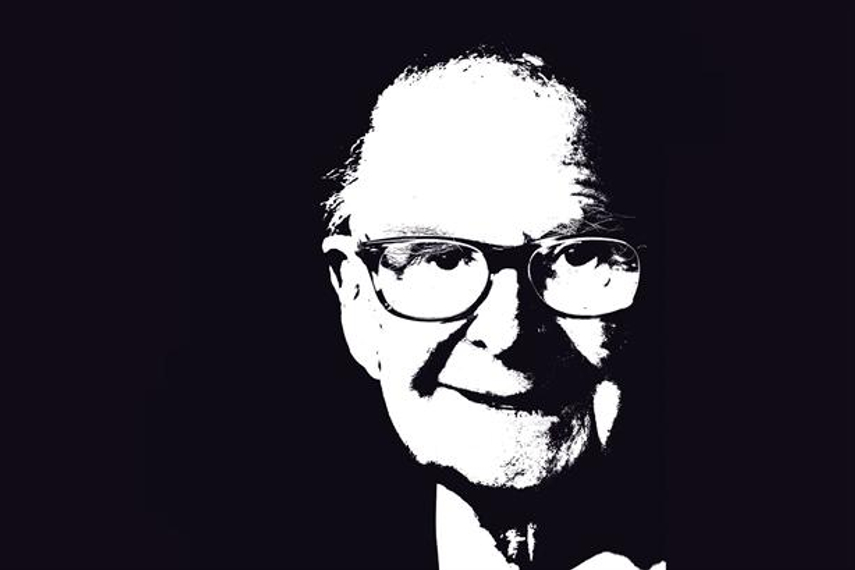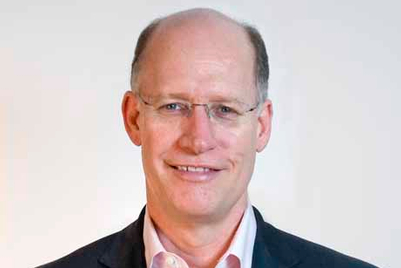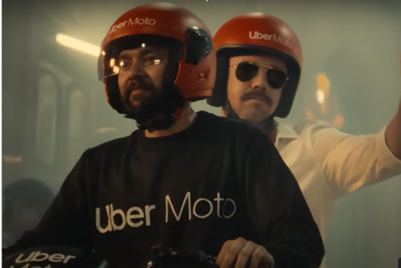
We tend to think of PR as a relatively modern practice, a product of our sophisticated but oh-so-shallow consumer society.
But communication finessed with a little persuasion has long been a feature of human culture.
Power and ideology are the glues that hold us together and PR has always been the way that they have been projected. Without it, there is no way of sharing a view of the world, no common purpose, no rallying of the troops.
"Public relations is synonymous with persuasion and my belief is that PR was applied as soon as people communicated," explains Burson-Marsteller co-founder Harold Burson.
"Rome did not have those wide boulevards because it had traffic jams. They were built to demonstrate to the world the power and the glory of Rome. We have always tried to persuade one another." He could have cited the pyramids, Stonehenge, the cave paintings at Lascaux or the current Winter Olympics in Sochi.
That’s the thing with Burson. You get historical perspective.
At 93, the amiable godfather of PR, founder of one of the world’s largest PR networks, the teenage interviewer of William Faulkner and reporter on the Nuremberg trials after World War Two, has lived history.
In fact he has been alive for virtually the entire existence of the modern PR industry. And although he does not say it explicitly, he clearly feels that removed from the heat of current operations it is one of the privileges – and duties – of age to look at the past and draw lessons for the present and the future.
You could dismiss much of it as the moaning of an old man that "it’s not like it was in my day". But an advantage of his advanced age is precisely that he can remember when the world wasn’t like it is now.
In his thoughtful way he sees that many of the things we take as axiomatic are not inevitable, but choices we have taken as a culture, and we may not even be aware that we have made these choices.
In the beginning
The practice of PR in its modern form originated in the US in the last quarter of the 19th century, largely in response to the extreme unpopularity of business.
It was an era of bare-knuckle capitalism. Poor working conditions, low wages and monopolistic practices had given it a bad rep among the general public so early PR people started developing techniques to put across business’ point of view. "But the first commercial offer of public relations was in 1900 when a man called Parker started a firm in Boston, although he called it ‘publicity’ at the time," Burson observes.

(Harold Burson in 1937)
There is a very old black and white picture of Burson, his photo byline from the University of Mississippi student newspaper, which shows him as a cheerful young man with an open expression and a desire to please.
More winsome than handsome, he looks like the sort of mild-mannered enthusiast who ran everywhere and would react to even the severest provocation by saying "golly".
Most of all, the photo captures a sense of his personal decency. This decency is still evident today in his easy good manners, his thoughtful way of expressing himself and even his politics.
Burson was born in Memphis, Tennessee in 1921. Exceptionally bright, he entered the University of Mississippi aged just 15. Four years later he joined the army as a combat engineer. In 1945, drawing on his journalistic experience at university, he joined the American Forces Network where he was assigned to cover the Nuremberg trials.
It is a mark of his meticulous reporting that although the original broadcasts have been lost, last year Burson’s transcript of the trials was released as an audio book: Report from Nuremberg: The International War Crimes Trial. It must be one of the few occasions when journalism was not just the first draft but the only draft of history.
Hear extracts from Burson's Nuremberg transcripts
On leaving the army he started his own PR company with an engineering firm he had formerly worked for as his first client. "I unconsciously differentiated my firm by specialising in business-to-business clients. Those firms were generally not taking advantage of the opportunities to tell their story to customers and prospects," he says.
He was assiduous about building high-level journalist networks and had a Rolodex with the names of editors of a hundred or more business and trade press writers.
In 1952 the Rolodex paid off. A friend at the New York Times tipped him off that Bill Marsteller, the owner of an up-and-coming Chicago b2b ad agency, was looking for a PR agency to work with his largest client, Rockwell manufacturing.
Birth of a legend
Burson somehow secured a three-page feature in LIFE magazine for a $289 home workshop tool (virtually enough to buy an entire home at the time). Within days of the article Rockwell was doing double shifts to keep up with demand.
Burson-Marsteller was born.
"We shared the same values, the most important of which was providing a high quality service to clients. We both advocated integrated communications, although we called it total communications. We both agreed that companies should speak with a disciplined voice and we both wanted clients to regard us as an extension of their own company," says Burson.
For a few years Burson-Marsteller chugged along quietly turning a hundred thousand, two, three hundred thousand dollars a year. The move that propelled him into the big time was the decision in the early 1960s to open his first office abroad: "I began to see the potential of PR becoming a sizeable worldwide business when the Treaty of Rome created the European Common Market in 1959."

(Harold Burson, c.1955 in his office at 800 Second Ave, New York)
It was a time when US companies were expanding manufacturing capacity overseas, largely to get behind trade barriers. The EU meant companies needed a coherent story all over the continent.
At the time the only other multinational PR agency was Hill & Knowlton, which was 20 times the size of Burson-Marsteller. For the next 25 years they remained the only two multinational PR agencies.
By 1969 Burson-Marsteller was turning over $4.4m a year. Within 14 years this had leapt to $64m and Burson was head of the world’s largest PR firm, employing 2,500 people in 50 offices.
The fastest period of growth came in the four years after he sold the company to Y&R in 1979. "Revenues almost doubled in that period," he says. "There was little cross-selling, no great new business push; we just became very popular." Y&R was in turn acquired by WPP in 2000. Today about 60 per cent of Burson-Marsteller’s revenues are generated outside the US.
But he identifies the secret of his success as not so much brilliant PR skills or business cunning, but the quality of the relationships he forged, particularly with employees. "I had the good fortune to build a worldwide team during the 1950s, 60s and 70s – about 150 people who stayed with us for 20 to 40 years, making client satisfaction their overriding goal. That as much as anything contributed to my success," he says.
An equally significant contribution to that growth was Burson-Marsteller’s pre-eminence in reputation management.
Seven people died after taking Johnson & Johnson’s Tylenol painkiller in 1982. Even though the company was not at fault, it assumed responsibility by removing the product from market, stopping all advertising and being open and available.
Burson was credited with creating the template for crisis management by advising on J&J’s response.
"Evil has Burson-Marsteller on speed dial"
But despite the high moral tone, the agency has had its fair share of controversial clients.
Critics point out that it was employed by the Nigerian government to discredit reports of genocide during the Biafran war, by the Argentinian junta after the disappearance of 35,000 civilians, and the Indonesian government after massacres in East Timor. It was also employed to buff up the image of the Romanian dictator Nicolae Ceausescu and the Saudi royal family.
Corporate clients in the past included the Three Mile Island nuclear plant, which suffered a partial meltdown in 1979, Union Carbide after the Bhopal gas leak killed up to 15,000 people in India, BP after the sinking of the Torrey Canyon oil tanker in 1967 and the British Government after BSE emerged. In the past few years it has acted for big tobacco companies and the European biotechnology industry.
More recently Burson-Marsteller was caught indulging in the dark arts when two of its executives were exposed as working for Facebook to plant negative stories about Google in the US media a couples of years ago.
Small wonder then that in 2012 MSNBC’s Rachel Maddow was moved to say: "When evil needs public relations, evil has Burson-Marsteller on speed dial."
The remark takes the wind out of Burson’s sails for a moment.
But then he shows why exactly he is one of the PR world’s greats with a calm, detailed and utterly plausible rebuttal.
"Nigeria – we were representing a legitimate government involved in a civil war. The Biafrans did a great PR job propagating myths that are still believed." He admits to working for Romania, not Ceausescu personally. "We were employed to gain favoured nation status with the US. At the time it was seen as one of the least repressive Communist block states," he says. "It was only later that Ceausescu became a tyrant."
The big mistake was working for the Argentinian junta. "We asked the State department and they said, ‘if you can help them build a democracy no problem’. Our job was economic, to help them pay their debts. It wasn’t political, but yes it was an error."
And as you might expect, he rejects the "evil on speed dial" tag. "We turned down all sorts of business over that period."
Such as?
"Libya. A major oil company that was trying to get sanctions lifted on Iraq. And we said no to the National Rifle Association."
Burson is renowned as someone who has mixed with the very, very rich and very, very powerful for decades.




(All the presidents' man: Harold Burson with world leaders, from top, Ronald Reagan, Jimmy Carter, Bill Clinton and Margaret Thatcher)
He used to have monthly lunches with the former US President Ronald Reagan and he is a close chum of billionaire investor Warren Buffett. He has known the CEOs and chairmen of many of the world’s largest corporations personally.
Given the, ahem, interesting backgroundof some of his clients you might expect him to be located politically somewhere on the right.
But no. Perhaps it is because his parents were English – they moved to Memphis from Leeds the year before he was born. Perhaps it is because he witnessed real poverty and hardship during the Great Depression of the 1930s.
"Politically I am a moderate," he says. "I am not registered to either party. Fiscally I am conservative, but socially in a country as wealthy as ours people really shouldn’t be going hungry and homeless." And he is appalled by the increasingly strident and partisan nature of US politics. "I am very disturbed by the behaviour of Congress [which briefly closed down government last year when it refused to ratify the Presidential budget]. I believe you fight it out in the election and then you compromise. It seems today that compromise is a dirty word."
This sense of moderation, that power only has legitimacy if it is put at the service of all in society, extends to the moral and ethical foundations of the industry to which he has dedicated most of his life.
For him PR is much more than spin, blather and corporate whitewash. It should be a force for truth and good.
He argues that one of the roles of PR is to be the conscience of the company: "I think PR has two components; behaviour and communications. You can have the best communications in the world but if you don’t live up to the promise you will not reach the objectives of your campaign or programme."
The curse of Nixon
He is deeply concerned by what he sees as a drift away from the behaviour side of the equation in modern PR.
In his book, the very fact that it is so often called ‘communications’ these days is a sign of loss of moral purpose: "PR started to be called communications in the 70s after Watergate. Nixon and his cohorts had repeatedly used the phrase PR as a solution to a problem they couldn’t otherwise solve," turning it into a dirty word.
"If you look at the titles of people in that role before 1974, 85 per cent had PR in them. Four years later most of them used the word communications. But ‘communications’ diminishes the totality of what we do because it indicates that the main function is not behaviour that really matters but messaging."
An aspect of this that particularly concerns him is the increasing control of the marketing function over PR: "Marketing has an important role to play vis-à-vis manufacture, research and all the operations that require money, but if you give control of PR to anyone but the CEO, you destroy the essence of what the company really is."
Further evidence that business may have lost its way is that companies are increasingly divorced from their social function, he argues: "I don’t blame corporate management but somewhere in the 1980s there was a change in the so-called contract between business and the public.
"In the earlier days," he explains, "the social contract was that corporations would make good products and goods services at a good price, would provide steady employment to their people, would be good corporate citizens, support the local hospital and so on. And they would deliver to shareholders a fair return on investment. The operative word was fair.
"But starting in the 80s the finance community came up with the concept that stock holders were entitled to a maximum return on their investment and not only would it be a maximum return, it would be a maximum return and year after year after year it would grow. And so much pressure has been on CEOs to cut costs that business is now doing things that are taking away from the product, the customer."

(Attending the PRWeek Awards in 2003, pictured with Jack Potter US Postmaster General)
He may have criticisms of modern business, but he remains optimistic about the future of PR.
The main source of his optimism is ironically the subject of what he cheerfully describes as "the worst decision I ever made": digital. "I just didn’t recognise the coming of the digital revolution as early as I should have," he admits.
Although in fairness to the man, he was already in his mid-seventies when digital took off.
But he seems to have genuinely embraced it now and has his own blog and web site, although he doesn’t have Twitter, Facebook or LinkedIn accounts.
However, he does have reservations – he describes digital as a "work in progress". "Many issues of its use still abound: privacy security, accuracy of information, its efficiency as a vehicle for paid advertising." And the ease of creating means that he sometimes feels "swamped, sometimes totally drowned" by the sheer volume of messages.
"But it offers new opportunities to be creatively innovative." And one of the main reasons he is optimistic is that it requires prodigious amounts of content and that is a great strength of the PR industry.
Fire them in the morning
Burson retired from active service at Burson-Marsteller in 1989. Surveying his career, he describes his greatest professional achievement not as advising some mega corporation or counselling a world famous politician, but helping remove the Confederate flags from the campus and stadium of his alma mater Ole Miss, the University of Mississippi. "They were resented by the African American community as a symbol of slavery," he explains simply.
Another mark of his gentle character is that he says he always found firing people very painful.
The hardest lesson he learned running a business was to share bad news as quickly and thoroughly as good news: "Eventually I learned that if I had to fire someone, rather than ruining the whole day I should make it the first task. I also learned that it was a lot easier when I did the deed in the office of the person to be dismissed. That way I could end the conversation when I wanted. By walking out."
Today, Harold Burson lives in a flat in New York’s Upper West Side. He moved back into the city when his wife died three years ago. While he is supported by his two sons and five grandchildren, you can hear the great loss echo in his voice when he speaks of her passing.
He is still one of the titans of PR; he still has an office at the agency, which he visits two or three days a week. And still keeps up contact with many of his former clients who have become lifelong friends.
But there is a creeping vulnerability that comes with great age. Last year his housekeeper was charged with second-degree grand larceny after forging his signature on $100,000 worth of cheques.
You cannot help feeling that she is one of the few people over the course of his 93 years who didn’t respond to this immensely decent man in kind.

(Harold Burson at 93)
The article first appeared on www.prweek.com


.jpg&h=334&w=500&q=100&v=20250320&c=1)
.jpg&h=334&w=500&q=100&v=20250320&c=1)



.jpg&h=334&w=500&q=100&v=20250320&c=1)



.jpg&h=334&w=500&q=100&v=20250320&c=1)








